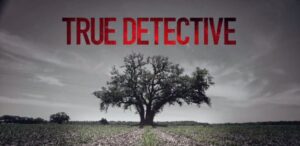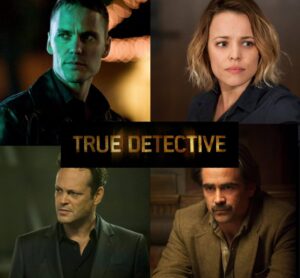I finally finished watching Season Three of True Detective, the last one I watched, and now it’s time for the big recap. What I hope to do with this review is compare and contrast the seasons to one another, pointing out the good and the bad. What went right and what went wrong.
I already compared Season One to Season Four of True Detective if you want to read about that. I’ll be making some of the same points here though. On with it.
Believable Detectives
In a detective show it is clear to me the detectives themselves must be believable. I’m not saying they have to be great detectives. If they are terrible at their job, that can be believable under certain circumstances. It’s vitally important the audience believes.
Season One
Utterly believable. I believe Kohl and Marty are seasoned, capable detectives. They go about their business with professionalism. We see them doing their work on many occasions and not just getting key information fed to them.
Season Two
Largely unbelievable. It’s a given in this season that Ray, Ani, and Paul are not the cream of the crop. Ray is chosen for the case because he’s compromised. That being said, none of them manage to do any sort of real detective work. Everything either falls into their laps or happens to be the first thing they investigate. I did not believe.
Season Three
Pretty much a mirror image of Season One. I absolutely believe Wayne and Roland are detectives, good ones.
Season Four
Utterly unbelievable. I just cannot believe that either Liz or Evangeline holds the position and rank they do. Both do little to no detective work in the series. Both rely on third parties to get all the pertinent information.
Likeable Protagonists
It’s useful if the audience likes the protagonists. I’m certainly not saying they have to be kind, nice, generous, thoughtful, and everything else that gets wrapped up into likeable; but I shouldn’t despise them. I shouldn’t find them repugnant and hate every moment they are on the screen.
Season One
Marty and Kohl are complicated characters and in many ways, not particularly likeable. They have big old flaws. But, in the end, I like both of them greatly while recognizing their flaws.
Season Two
I hate Ray and Ani. Hate. Paul is more a figure of pity than anything else but he’s certainly not likeable. Ray is an awful, despicable person and Ani isn’t any better.
Season Three
Again, we have two flawed characters. Both with problems but both likeable in the end. Roland and Wayne want to solve the case, they care about the missing girl. They are decent human beings although hardly perfect.
Season Four
It’s hard to even describe how much I despised Liz and Evangeline. They are terrible people. Just awful. Horrible to everyone they meet. I can’t remember hating protagonists this much in any other show.
Sundried Film Making Features
I’m not going with a season breakdown here. The music, sets, camera work, and everything else is almost always fantastic. One exception is the mumbling of Wayne in Season Two. He’s not always understandable. Other than that, all four seasons are superb.
Comprehensible Story
Season One
I followed the plot all the way through with little or no confusion. It all made sense. Events happened in good sequence and I was rarely, if ever confused.
Season Two
A jumble. The case was far too convoluted and wasn’t even really about what it was apparently about. I was totally lost on several occasions and by the end just didn’t care anymore.
Season Three
It was largely understandable but the three separate timelines were one too many. The two timelines in Season One worked very nicely. Mainly because they were sequential. In Season Three we are constantly transported back and forth in time and it became too much. Particularly when it came to the final episode. More on that in a minute.
Season Four
This one wasn’t even really a detective story, it was a macabre horror story. It didn’t make any sense at all for the most part. The entire supernatural element was jammed at us the entire series run and yet turned out to be a giant red-herring. I understood events to some degree but it was generally a bit of a mess.
Stick the Landing
The ending must be right or everything before it loses its luster.
Season One
Perfection. Marty’s final gift to Kohl wrapped it up with a pretty bow and sent me away completely satisfied.
Season Two
The story itself ended incomprehensibly as mentioned earlier but if anyone didn’t see the final twist with Ray and his son coming, they must have fallen asleep and stopped paying attention. Dull, contrived, sappy.
Season Three
I’m not even sure they knew how to end this season and just threw everything at us in a mess of a final episode. I was quite satisfied with Julie’s final fate but everything else just seemed tacked on. All the relationship things just did not land.
Season Four
I actually really liked the resolution to the case here but it flew in the face of everything they gave us before. I imagine it angered many who were invested in the supernatural events preceding.
Conclusion
Season One is fantastic. Season Two is poor. Season Three was almost as good as Season One except the mumbling and failed finale. Season Four was fine if you like supernatural horror but was otherwise not even really a True Detective show.
Season Five? I’ll be waiting.
Tom Liberman

